Cambridge Analytica Scandal: Ethical and Legal Framework Analysis
VerifiedAdded on 2023/06/05
|7
|1898
|242
Essay
AI Summary
This essay delves into the ethical implications of the Cambridge Analytica scandal, examining the case through the lens of various ethical theories including deontology, utilitarianism, virtue theory, and contract theory. The analysis highlights the ethical failures of Cambridge Analytica in protecting user data and upholding societal trust, ultimately leading to a breach of privacy and security. Each ethical theory provides a unique perspective on the company's actions, revealing the extent of their ethical missteps. The essay concludes by emphasizing the need for stricter regulations and security measures to prevent similar incidents, advocating for greater corporate responsibility and increased user awareness regarding data privacy. Desklib offers a wealth of similar resources, including past papers and solved assignments, for students seeking to deepen their understanding of ethical and legal issues in the digital age.

Social Media
Paraphrase This Document
Need a fresh take? Get an instant paraphrase of this document with our AI Paraphraser
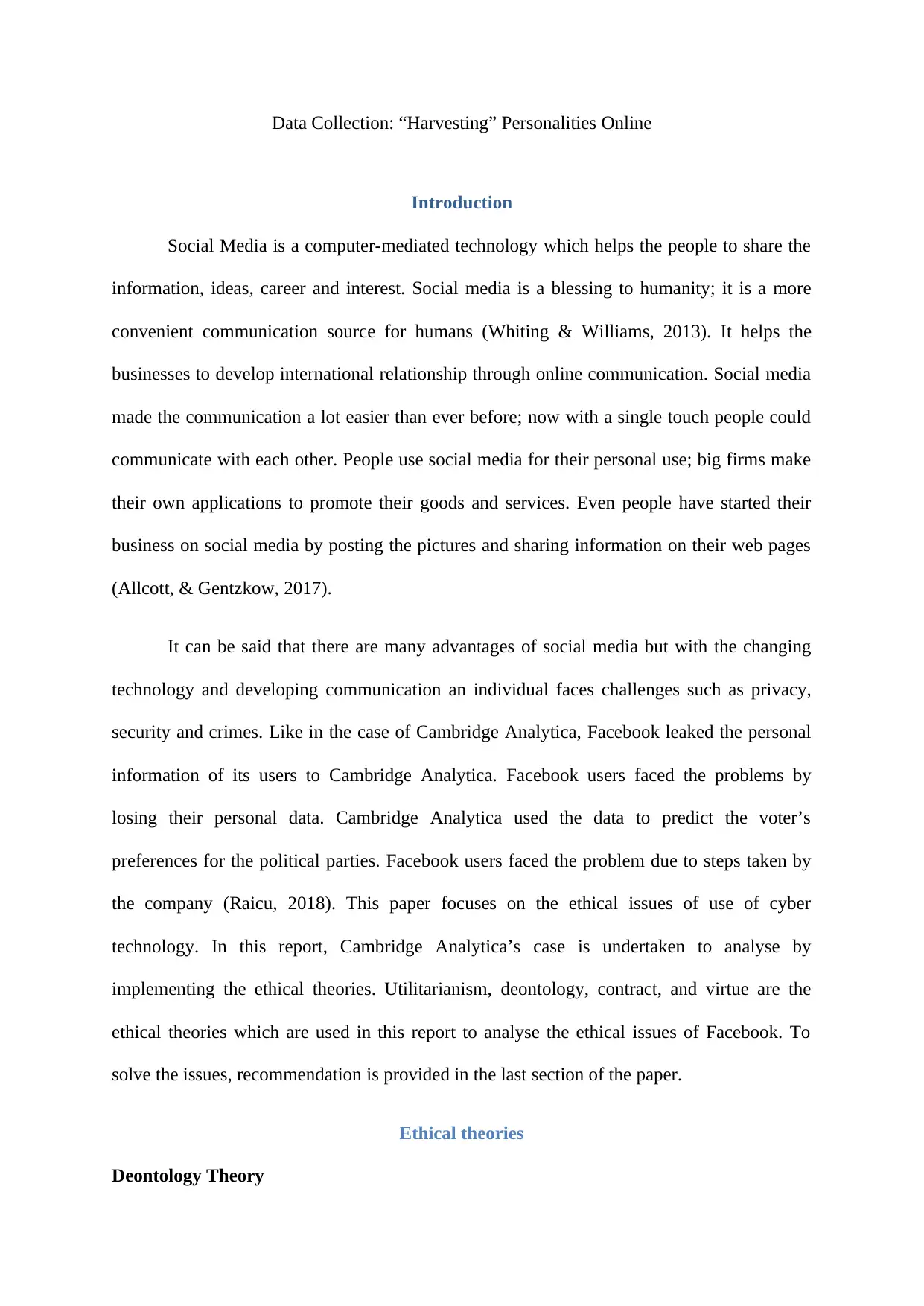
Data Collection: “Harvesting” Personalities Online
Introduction
Social Media is a computer-mediated technology which helps the people to share the
information, ideas, career and interest. Social media is a blessing to humanity; it is a more
convenient communication source for humans (Whiting & Williams, 2013). It helps the
businesses to develop international relationship through online communication. Social media
made the communication a lot easier than ever before; now with a single touch people could
communicate with each other. People use social media for their personal use; big firms make
their own applications to promote their goods and services. Even people have started their
business on social media by posting the pictures and sharing information on their web pages
(Allcott, & Gentzkow, 2017).
It can be said that there are many advantages of social media but with the changing
technology and developing communication an individual faces challenges such as privacy,
security and crimes. Like in the case of Cambridge Analytica, Facebook leaked the personal
information of its users to Cambridge Analytica. Facebook users faced the problems by
losing their personal data. Cambridge Analytica used the data to predict the voter’s
preferences for the political parties. Facebook users faced the problem due to steps taken by
the company (Raicu, 2018). This paper focuses on the ethical issues of use of cyber
technology. In this report, Cambridge Analytica’s case is undertaken to analyse by
implementing the ethical theories. Utilitarianism, deontology, contract, and virtue are the
ethical theories which are used in this report to analyse the ethical issues of Facebook. To
solve the issues, recommendation is provided in the last section of the paper.
Ethical theories
Deontology Theory
Introduction
Social Media is a computer-mediated technology which helps the people to share the
information, ideas, career and interest. Social media is a blessing to humanity; it is a more
convenient communication source for humans (Whiting & Williams, 2013). It helps the
businesses to develop international relationship through online communication. Social media
made the communication a lot easier than ever before; now with a single touch people could
communicate with each other. People use social media for their personal use; big firms make
their own applications to promote their goods and services. Even people have started their
business on social media by posting the pictures and sharing information on their web pages
(Allcott, & Gentzkow, 2017).
It can be said that there are many advantages of social media but with the changing
technology and developing communication an individual faces challenges such as privacy,
security and crimes. Like in the case of Cambridge Analytica, Facebook leaked the personal
information of its users to Cambridge Analytica. Facebook users faced the problems by
losing their personal data. Cambridge Analytica used the data to predict the voter’s
preferences for the political parties. Facebook users faced the problem due to steps taken by
the company (Raicu, 2018). This paper focuses on the ethical issues of use of cyber
technology. In this report, Cambridge Analytica’s case is undertaken to analyse by
implementing the ethical theories. Utilitarianism, deontology, contract, and virtue are the
ethical theories which are used in this report to analyse the ethical issues of Facebook. To
solve the issues, recommendation is provided in the last section of the paper.
Ethical theories
Deontology Theory
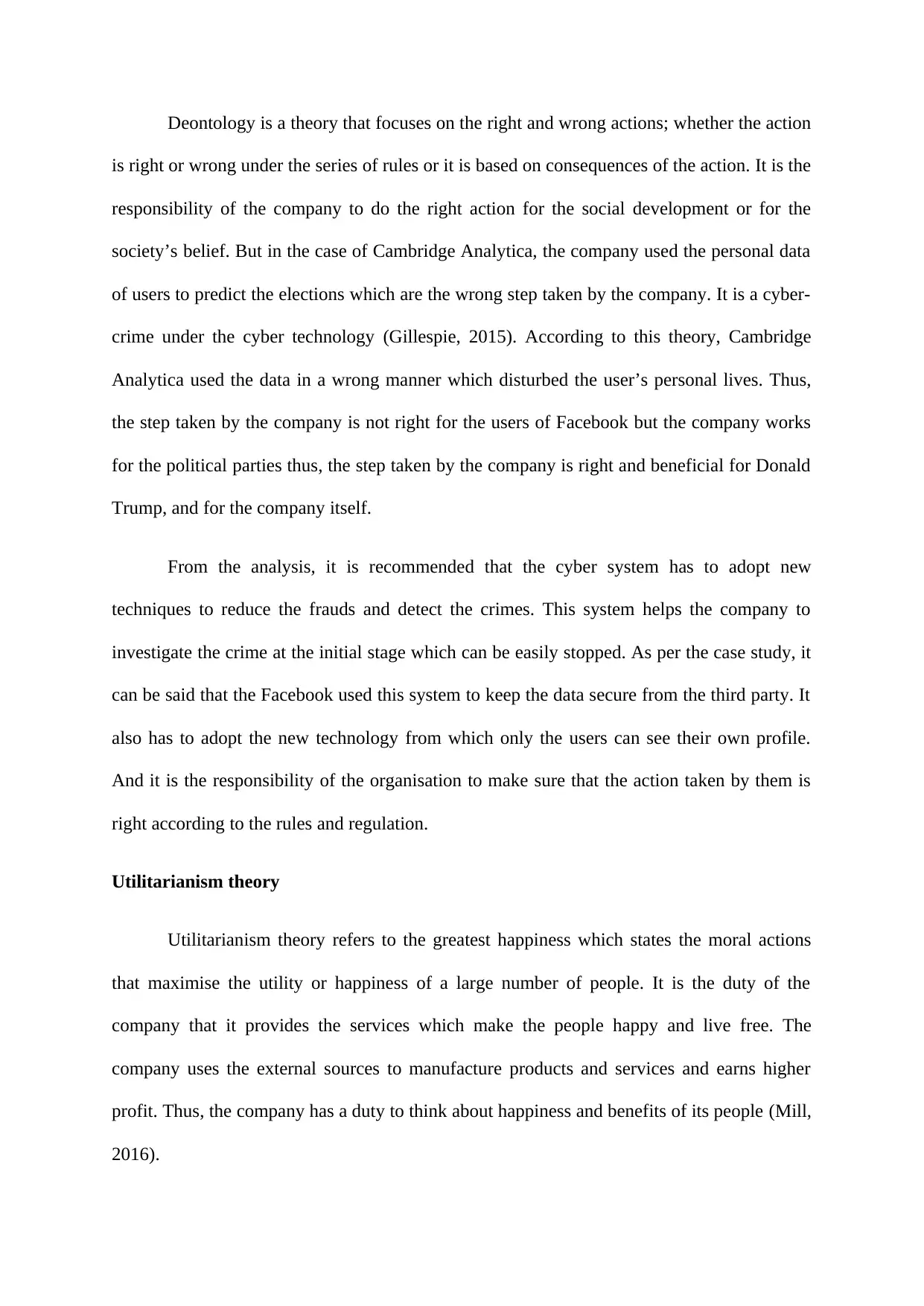
Deontology is a theory that focuses on the right and wrong actions; whether the action
is right or wrong under the series of rules or it is based on consequences of the action. It is the
responsibility of the company to do the right action for the social development or for the
society’s belief. But in the case of Cambridge Analytica, the company used the personal data
of users to predict the elections which are the wrong step taken by the company. It is a cyber-
crime under the cyber technology (Gillespie, 2015). According to this theory, Cambridge
Analytica used the data in a wrong manner which disturbed the user’s personal lives. Thus,
the step taken by the company is not right for the users of Facebook but the company works
for the political parties thus, the step taken by the company is right and beneficial for Donald
Trump, and for the company itself.
From the analysis, it is recommended that the cyber system has to adopt new
techniques to reduce the frauds and detect the crimes. This system helps the company to
investigate the crime at the initial stage which can be easily stopped. As per the case study, it
can be said that the Facebook used this system to keep the data secure from the third party. It
also has to adopt the new technology from which only the users can see their own profile.
And it is the responsibility of the organisation to make sure that the action taken by them is
right according to the rules and regulation.
Utilitarianism theory
Utilitarianism theory refers to the greatest happiness which states the moral actions
that maximise the utility or happiness of a large number of people. It is the duty of the
company that it provides the services which make the people happy and live free. The
company uses the external sources to manufacture products and services and earns higher
profit. Thus, the company has a duty to think about happiness and benefits of its people (Mill,
2016).
is right or wrong under the series of rules or it is based on consequences of the action. It is the
responsibility of the company to do the right action for the social development or for the
society’s belief. But in the case of Cambridge Analytica, the company used the personal data
of users to predict the elections which are the wrong step taken by the company. It is a cyber-
crime under the cyber technology (Gillespie, 2015). According to this theory, Cambridge
Analytica used the data in a wrong manner which disturbed the user’s personal lives. Thus,
the step taken by the company is not right for the users of Facebook but the company works
for the political parties thus, the step taken by the company is right and beneficial for Donald
Trump, and for the company itself.
From the analysis, it is recommended that the cyber system has to adopt new
techniques to reduce the frauds and detect the crimes. This system helps the company to
investigate the crime at the initial stage which can be easily stopped. As per the case study, it
can be said that the Facebook used this system to keep the data secure from the third party. It
also has to adopt the new technology from which only the users can see their own profile.
And it is the responsibility of the organisation to make sure that the action taken by them is
right according to the rules and regulation.
Utilitarianism theory
Utilitarianism theory refers to the greatest happiness which states the moral actions
that maximise the utility or happiness of a large number of people. It is the duty of the
company that it provides the services which make the people happy and live free. The
company uses the external sources to manufacture products and services and earns higher
profit. Thus, the company has a duty to think about happiness and benefits of its people (Mill,
2016).
⊘ This is a preview!⊘
Do you want full access?
Subscribe today to unlock all pages.

Trusted by 1+ million students worldwide
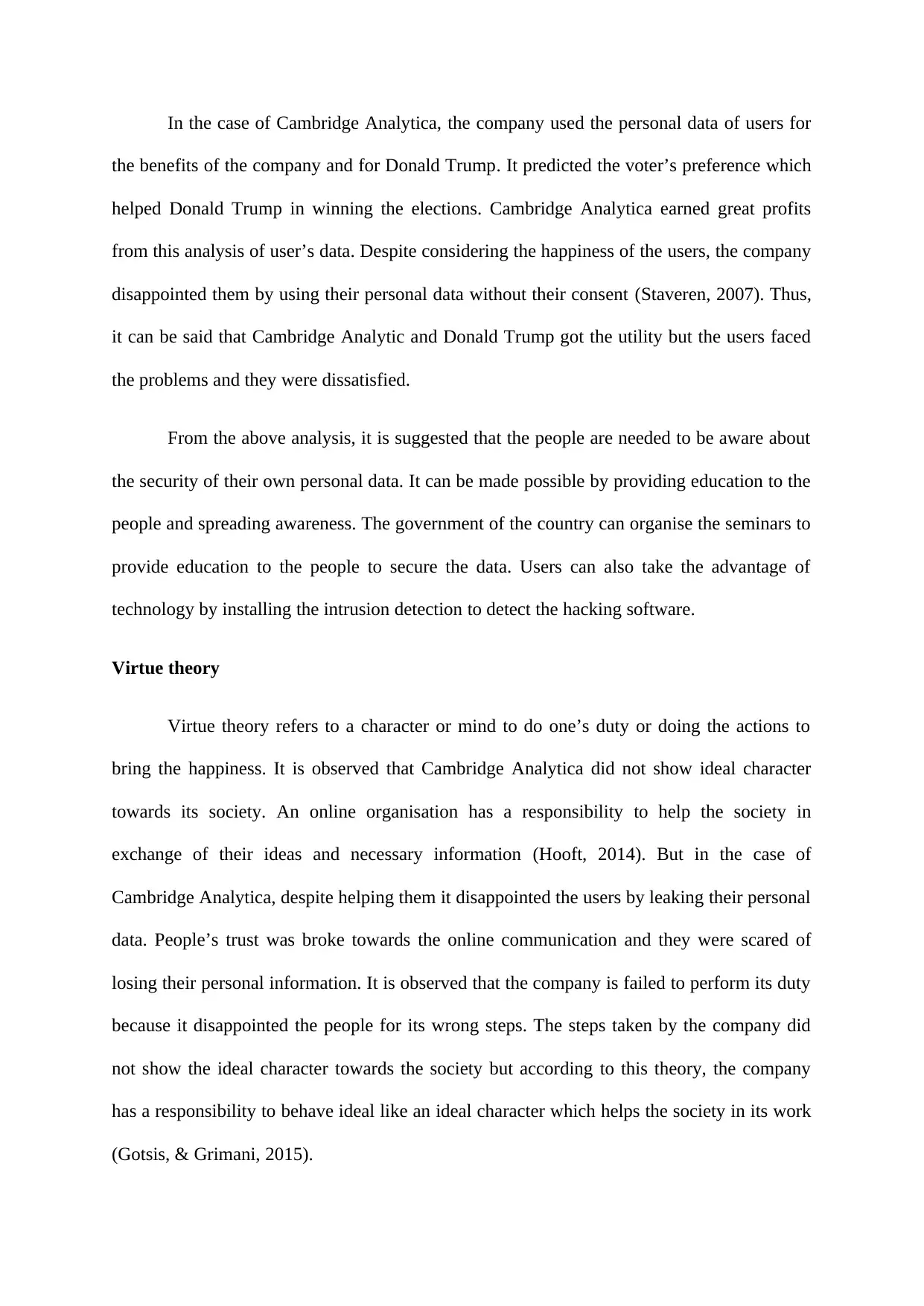
In the case of Cambridge Analytica, the company used the personal data of users for
the benefits of the company and for Donald Trump. It predicted the voter’s preference which
helped Donald Trump in winning the elections. Cambridge Analytica earned great profits
from this analysis of user’s data. Despite considering the happiness of the users, the company
disappointed them by using their personal data without their consent (Staveren, 2007). Thus,
it can be said that Cambridge Analytic and Donald Trump got the utility but the users faced
the problems and they were dissatisfied.
From the above analysis, it is suggested that the people are needed to be aware about
the security of their own personal data. It can be made possible by providing education to the
people and spreading awareness. The government of the country can organise the seminars to
provide education to the people to secure the data. Users can also take the advantage of
technology by installing the intrusion detection to detect the hacking software.
Virtue theory
Virtue theory refers to a character or mind to do one’s duty or doing the actions to
bring the happiness. It is observed that Cambridge Analytica did not show ideal character
towards its society. An online organisation has a responsibility to help the society in
exchange of their ideas and necessary information (Hooft, 2014). But in the case of
Cambridge Analytica, despite helping them it disappointed the users by leaking their personal
data. People’s trust was broke towards the online communication and they were scared of
losing their personal information. It is observed that the company is failed to perform its duty
because it disappointed the people for its wrong steps. The steps taken by the company did
not show the ideal character towards the society but according to this theory, the company
has a responsibility to behave ideal like an ideal character which helps the society in its work
(Gotsis, & Grimani, 2015).
the benefits of the company and for Donald Trump. It predicted the voter’s preference which
helped Donald Trump in winning the elections. Cambridge Analytica earned great profits
from this analysis of user’s data. Despite considering the happiness of the users, the company
disappointed them by using their personal data without their consent (Staveren, 2007). Thus,
it can be said that Cambridge Analytic and Donald Trump got the utility but the users faced
the problems and they were dissatisfied.
From the above analysis, it is suggested that the people are needed to be aware about
the security of their own personal data. It can be made possible by providing education to the
people and spreading awareness. The government of the country can organise the seminars to
provide education to the people to secure the data. Users can also take the advantage of
technology by installing the intrusion detection to detect the hacking software.
Virtue theory
Virtue theory refers to a character or mind to do one’s duty or doing the actions to
bring the happiness. It is observed that Cambridge Analytica did not show ideal character
towards its society. An online organisation has a responsibility to help the society in
exchange of their ideas and necessary information (Hooft, 2014). But in the case of
Cambridge Analytica, despite helping them it disappointed the users by leaking their personal
data. People’s trust was broke towards the online communication and they were scared of
losing their personal information. It is observed that the company is failed to perform its duty
because it disappointed the people for its wrong steps. The steps taken by the company did
not show the ideal character towards the society but according to this theory, the company
has a responsibility to behave ideal like an ideal character which helps the society in its work
(Gotsis, & Grimani, 2015).
Paraphrase This Document
Need a fresh take? Get an instant paraphrase of this document with our AI Paraphraser
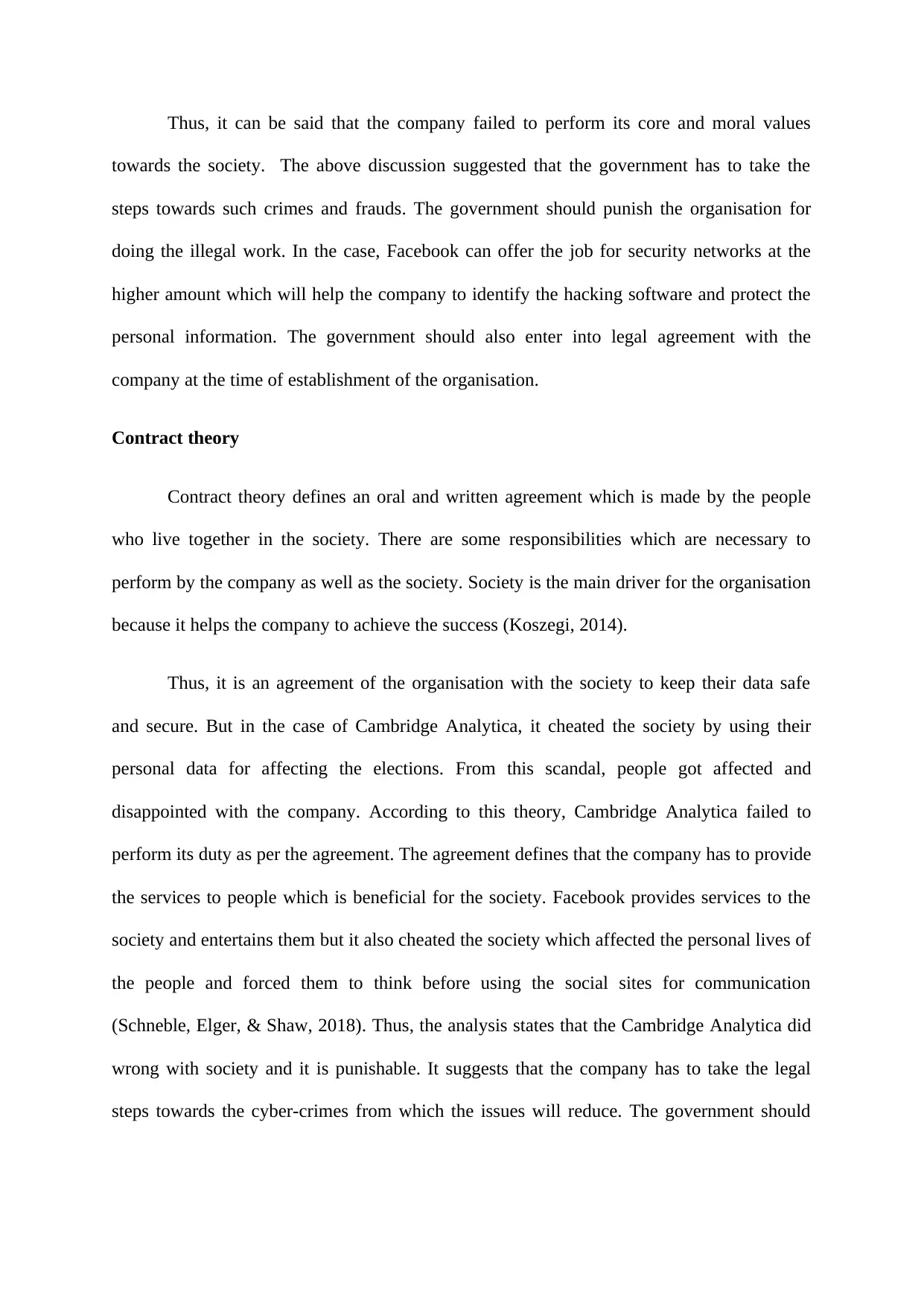
Thus, it can be said that the company failed to perform its core and moral values
towards the society. The above discussion suggested that the government has to take the
steps towards such crimes and frauds. The government should punish the organisation for
doing the illegal work. In the case, Facebook can offer the job for security networks at the
higher amount which will help the company to identify the hacking software and protect the
personal information. The government should also enter into legal agreement with the
company at the time of establishment of the organisation.
Contract theory
Contract theory defines an oral and written agreement which is made by the people
who live together in the society. There are some responsibilities which are necessary to
perform by the company as well as the society. Society is the main driver for the organisation
because it helps the company to achieve the success (Koszegi, 2014).
Thus, it is an agreement of the organisation with the society to keep their data safe
and secure. But in the case of Cambridge Analytica, it cheated the society by using their
personal data for affecting the elections. From this scandal, people got affected and
disappointed with the company. According to this theory, Cambridge Analytica failed to
perform its duty as per the agreement. The agreement defines that the company has to provide
the services to people which is beneficial for the society. Facebook provides services to the
society and entertains them but it also cheated the society which affected the personal lives of
the people and forced them to think before using the social sites for communication
(Schneble, Elger, & Shaw, 2018). Thus, the analysis states that the Cambridge Analytica did
wrong with society and it is punishable. It suggests that the company has to take the legal
steps towards the cyber-crimes from which the issues will reduce. The government should
towards the society. The above discussion suggested that the government has to take the
steps towards such crimes and frauds. The government should punish the organisation for
doing the illegal work. In the case, Facebook can offer the job for security networks at the
higher amount which will help the company to identify the hacking software and protect the
personal information. The government should also enter into legal agreement with the
company at the time of establishment of the organisation.
Contract theory
Contract theory defines an oral and written agreement which is made by the people
who live together in the society. There are some responsibilities which are necessary to
perform by the company as well as the society. Society is the main driver for the organisation
because it helps the company to achieve the success (Koszegi, 2014).
Thus, it is an agreement of the organisation with the society to keep their data safe
and secure. But in the case of Cambridge Analytica, it cheated the society by using their
personal data for affecting the elections. From this scandal, people got affected and
disappointed with the company. According to this theory, Cambridge Analytica failed to
perform its duty as per the agreement. The agreement defines that the company has to provide
the services to people which is beneficial for the society. Facebook provides services to the
society and entertains them but it also cheated the society which affected the personal lives of
the people and forced them to think before using the social sites for communication
(Schneble, Elger, & Shaw, 2018). Thus, the analysis states that the Cambridge Analytica did
wrong with society and it is punishable. It suggests that the company has to take the legal
steps towards the cyber-crimes from which the issues will reduce. The government should
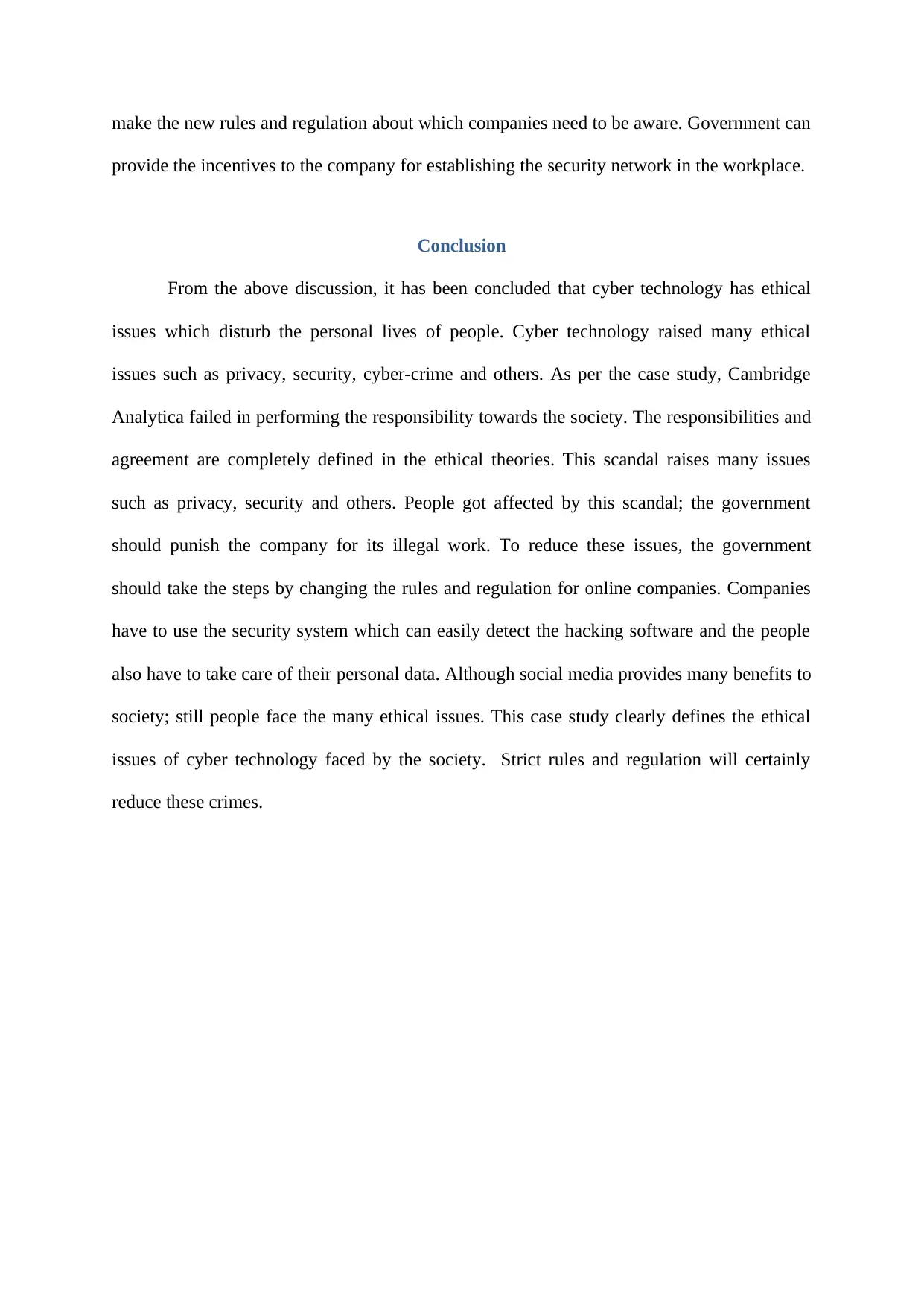
make the new rules and regulation about which companies need to be aware. Government can
provide the incentives to the company for establishing the security network in the workplace.
Conclusion
From the above discussion, it has been concluded that cyber technology has ethical
issues which disturb the personal lives of people. Cyber technology raised many ethical
issues such as privacy, security, cyber-crime and others. As per the case study, Cambridge
Analytica failed in performing the responsibility towards the society. The responsibilities and
agreement are completely defined in the ethical theories. This scandal raises many issues
such as privacy, security and others. People got affected by this scandal; the government
should punish the company for its illegal work. To reduce these issues, the government
should take the steps by changing the rules and regulation for online companies. Companies
have to use the security system which can easily detect the hacking software and the people
also have to take care of their personal data. Although social media provides many benefits to
society; still people face the many ethical issues. This case study clearly defines the ethical
issues of cyber technology faced by the society. Strict rules and regulation will certainly
reduce these crimes.
provide the incentives to the company for establishing the security network in the workplace.
Conclusion
From the above discussion, it has been concluded that cyber technology has ethical
issues which disturb the personal lives of people. Cyber technology raised many ethical
issues such as privacy, security, cyber-crime and others. As per the case study, Cambridge
Analytica failed in performing the responsibility towards the society. The responsibilities and
agreement are completely defined in the ethical theories. This scandal raises many issues
such as privacy, security and others. People got affected by this scandal; the government
should punish the company for its illegal work. To reduce these issues, the government
should take the steps by changing the rules and regulation for online companies. Companies
have to use the security system which can easily detect the hacking software and the people
also have to take care of their personal data. Although social media provides many benefits to
society; still people face the many ethical issues. This case study clearly defines the ethical
issues of cyber technology faced by the society. Strict rules and regulation will certainly
reduce these crimes.
⊘ This is a preview!⊘
Do you want full access?
Subscribe today to unlock all pages.

Trusted by 1+ million students worldwide
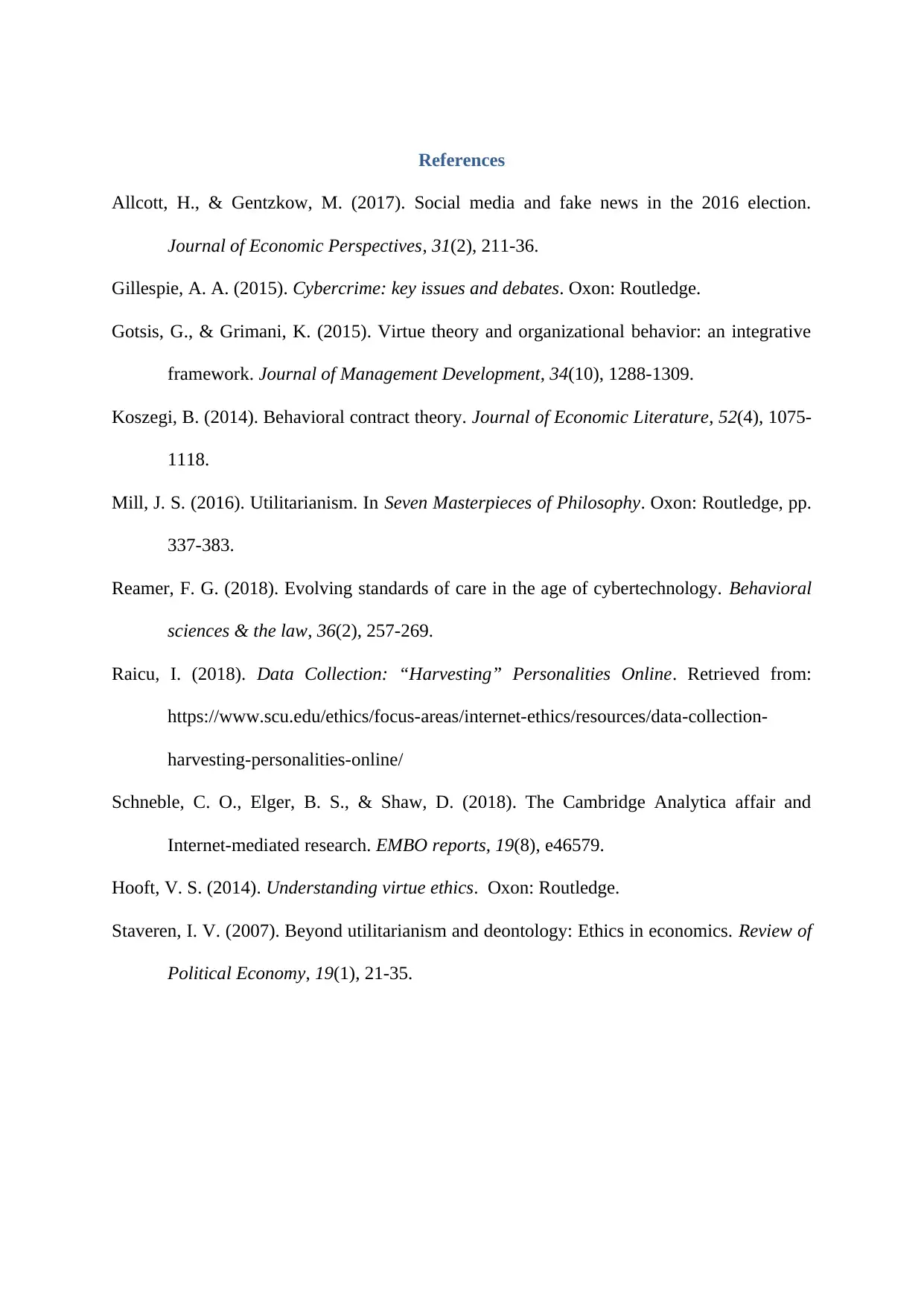
References
Allcott, H., & Gentzkow, M. (2017). Social media and fake news in the 2016 election.
Journal of Economic Perspectives, 31(2), 211-36.
Gillespie, A. A. (2015). Cybercrime: key issues and debates. Oxon: Routledge.
Gotsis, G., & Grimani, K. (2015). Virtue theory and organizational behavior: an integrative
framework. Journal of Management Development, 34(10), 1288-1309.
Koszegi, B. (2014). Behavioral contract theory. Journal of Economic Literature, 52(4), 1075-
1118.
Mill, J. S. (2016). Utilitarianism. In Seven Masterpieces of Philosophy. Oxon: Routledge, pp.
337-383.
Reamer, F. G. (2018). Evolving standards of care in the age of cybertechnology. Behavioral
sciences & the law, 36(2), 257-269.
Raicu, I. (2018). Data Collection: “Harvesting” Personalities Online. Retrieved from:
https://www.scu.edu/ethics/focus-areas/internet-ethics/resources/data-collection-
harvesting-personalities-online/
Schneble, C. O., Elger, B. S., & Shaw, D. (2018). The Cambridge Analytica affair and
Internet‐mediated research. EMBO reports, 19(8), e46579.
Hooft, V. S. (2014). Understanding virtue ethics. Oxon: Routledge.
Staveren, I. V. (2007). Beyond utilitarianism and deontology: Ethics in economics. Review of
Political Economy, 19(1), 21-35.
Allcott, H., & Gentzkow, M. (2017). Social media and fake news in the 2016 election.
Journal of Economic Perspectives, 31(2), 211-36.
Gillespie, A. A. (2015). Cybercrime: key issues and debates. Oxon: Routledge.
Gotsis, G., & Grimani, K. (2015). Virtue theory and organizational behavior: an integrative
framework. Journal of Management Development, 34(10), 1288-1309.
Koszegi, B. (2014). Behavioral contract theory. Journal of Economic Literature, 52(4), 1075-
1118.
Mill, J. S. (2016). Utilitarianism. In Seven Masterpieces of Philosophy. Oxon: Routledge, pp.
337-383.
Reamer, F. G. (2018). Evolving standards of care in the age of cybertechnology. Behavioral
sciences & the law, 36(2), 257-269.
Raicu, I. (2018). Data Collection: “Harvesting” Personalities Online. Retrieved from:
https://www.scu.edu/ethics/focus-areas/internet-ethics/resources/data-collection-
harvesting-personalities-online/
Schneble, C. O., Elger, B. S., & Shaw, D. (2018). The Cambridge Analytica affair and
Internet‐mediated research. EMBO reports, 19(8), e46579.
Hooft, V. S. (2014). Understanding virtue ethics. Oxon: Routledge.
Staveren, I. V. (2007). Beyond utilitarianism and deontology: Ethics in economics. Review of
Political Economy, 19(1), 21-35.
1 out of 7
Related Documents
Your All-in-One AI-Powered Toolkit for Academic Success.
+13062052269
info@desklib.com
Available 24*7 on WhatsApp / Email
![[object Object]](/_next/static/media/star-bottom.7253800d.svg)
Unlock your academic potential
Copyright © 2020–2026 A2Z Services. All Rights Reserved. Developed and managed by ZUCOL.




